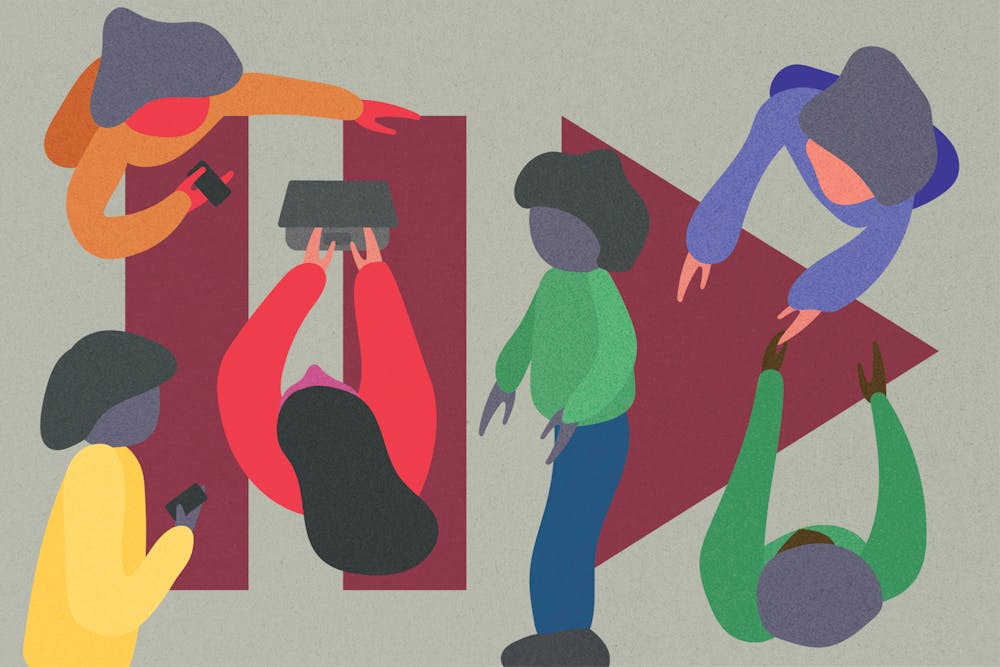Kosmeh walked straight home.
“It just felt like the natural progression of things to try and go somewhere, where it was a safe space. And then, I could just sort of reflect on things because it was stressful,” he said.
Kosmeh is a physics major, a department in which he told me many of the instructors and faculty knew Zijie Yan, the Department of Applied Physical Sciences associate professor and victim of the fatal shooting.
“One of my professors knew him on a personal level. He held class [on Thursday] and he gave a really, really sweet memoir about what kind of person he was and how he worked with him. He expressed that it was scary. He was actually supposed to be in their lab at 2 p.m. on Monday.”
And normalcy?
“Things have gotten back to as much normal as they can be given the situation,” Kosmeh concluded.
Sitao Lin, sophomore
Lin took a bus to Southpoint Mall with friends the next day to be off-campus.
“The friends that were with me — they both happened to be international students from China. A lot of our first concerns was the potential of an increase in anti-Asian sentiments and Sinophobia because the shooter and the victim both happened to be Chinese international student and faculty,”
“I've already noticed some people making comments about how they weren't surprised the shooter was Chinese or how of course they were from Wuhan, which just compounded the Sinophobia that I witnessed during COVID.”
Lin feels that these reactions speak to the challenges that students and faculty face coming to Carolina.
“I feel that the university, despite their announcements mentioning community, unity and celebrating our diversity and differences, sometimes they don't really follow up on those promises. It seems to me that a lot of the words are just very performative.”
To get the day's news and headlines in your inbox each morning, sign up for our email newsletters.
Muhsin Mahmud, junior exchange student from the UK
Mahmud called his family in London, who watched the news unfold from overseas.
“It was a moment that they were contemplating whether or not I should be going home and whether or not I should close the curtains on my dream, my American dream.”
He recalled sitting down in a collapse on a bench along Franklin Street to process reality.
“It took quite a lot for me to, before coming, put aside that fear of gun violence and for me to really believe that I would be safe in America. The fact that in less than a week, I had already been in such a traumatizing and traumatic experience. It doesn't change the way I perceive American people or at least American states, but it does change the way that I perceive the state of America and where safety currently sits.”
Caitlin Kearney, PhD candidate and graduate teaching fellow, School of Education
Kearney drove home after getting out of lockdown and finally leaving the basement of Peabody Hall.
“I was at a stoplight and I saw the notification that someone had been killed… my heart really sank.”
She decided that she would come back to campus on Thursday to do work with peers.
“I do think it was helpful for me personally to reclaim [Peabody Hall], where I've been for the last four years,” she said.
She had yet to return to her teaching responsibilities and said many questions are still up in the air.
“How are we going to work with our students and how are we going to support people that had really traumatic experiences? That part still is a little bit of a question mark for me.”
A new normal
To borrow Kearney’s words, “a question mark” may represent how many of us feel and may feel for a long time. But perhaps these shared feelings of uncertainty will help us gain some comfort that we are unsure together, figuring out a new norm.
Le HaLe Ha is the 2023-24 opinion editor at The Daily Tar Heel. She has previously served as an editorial board member. Le is a sophomore pursuing a double major in media and journalism and information science, with a business minor.




